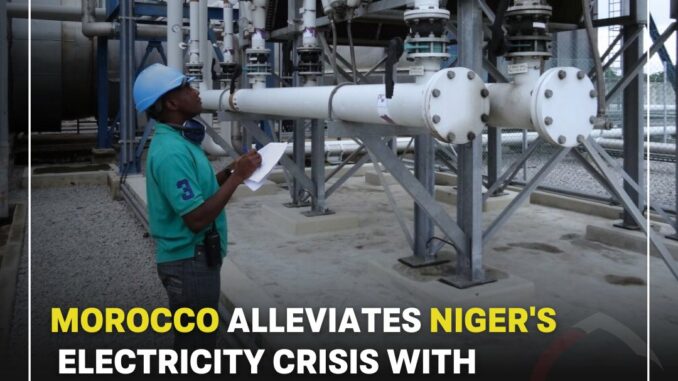
A power plant donated by Morocco to Niger upon the instructions of King Mohammed VI was inaugurated this Thursday December 12, in Niamey, Niger. The facility was named after the Sovereign, “His Majesty King Mohammed VI” power plant.
The inauguration ceremony was organized under the high patronage of Brigadier General Abdourrahmane Tiani, President of the National Council for the Safeguard of the Homeland (CNSP), and presided over by Niger’s Prime Minister and Minister of Economy and Finance, Ali Mahamane Lamine Zeine, in the presence of a large Moroccan delegation.
The power plant, located in the Gamkaley industrial area of Niamey, is equipped with state-of-the-art technology, and has an electricity production capacity of 22.5 MVA (20 MW). It will contribute to improving the electricity supply for Niger’s population and strengthening the country’s energy sovereignty.
This donation from Morocco is part of Kingdom’s unwavering commitment to strengthen fraternal relations with Niger and help the Sahel country cope with the severe energy crisis it is facing. The power plant is a testament to a fruitful bilateral cooperation enriched by solidarity-driven initiatives aimed at the prosperity of both nations and the development of a stable and emerging Niger.
The plant reflects the ambitious vision of active solidarity championed by King Mohammed VI in support of sustainable human development across the African continent. It also aligns with major initiatives launched by the Sovereign to support the development of Sahel countries, such as the Royal Initiative to facilitate these countries’ access to the Atlantic Ocean.
The project, coordinated by the Moroccan Agency for International Cooperation, was completed in a short time frame and its management entrusted to a joint team comprising representatives from Morocco’s Office of Electricity and Potable Water (ONEE), and Niger’s Electricity Company (NIGELEC).
The inauguration ceremony of the power plant was also attended by members of the CNSP, the transitional government, the diplomatic corps, representatives of international organizations, members of the Moroccan community in Niger, as well as representatives of the civil society, and Nigerien religious institutions.
